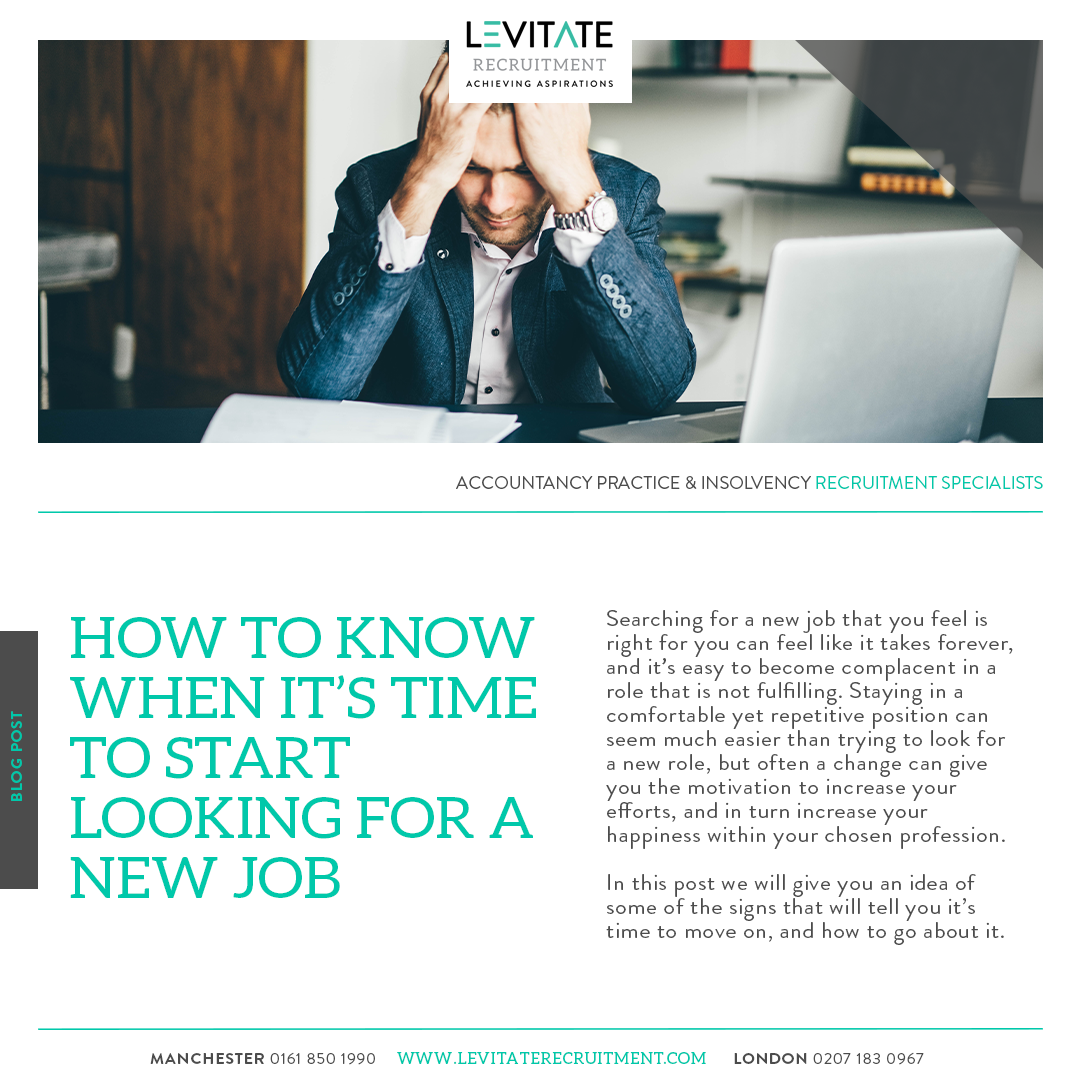Searching for a new job that you feel is right for you can feel like it takes forever, and it’s easy to become complacent in a role that is not fulfilling. Staying in a comfortable yet repetitive position can seem much easier than trying to look for a new role, but often a change can give you the motivation to increase your efforts, and in turn, increase your happiness within your chosen profession.
It can be incredibly refreshing to change to a new company and experience new practices and clients. This post is intended to give you an idea of some of the signs that will tell you it’s time to move on, and how to go about it.
The Signs
No route for progression
This is a popular reason people tend to move on from a job, however, it is often overlooked when starting your career for the first time. As you develop your experience and progress within a firm you may reach a ceiling where future progression can become very difficult.
Lack of progression can be that there is no room to advance your position (promotions) or that the level of work will no longer differ from what you have already done, meaning that your professional development can stagnate (I will cover this point later).
The size and type of firm you work for can have an impact on what level of progression opportunities exist. Some examples include;
- Firms can be ‘top heavy’ meaning that there are already several Senior Management level employees in positions which can result in there being no room for further positions at a Senior Management level.
- Promotions are not meritocratic, meaning that career progression is not based on being the best person for the role at the time.
- Those in the more senior management positions are ‘lifers’ within the firm. Meaning this individual is unlikely to ever leave the firm/position as they have everything they need from their career within their role. This can block your career progression.
- In some smaller firms, there may be limited opportunities to progress purely due to the size of the team. For instance, there is no need for 2 managers to manage a team of 4 when one manager is enough.
You’ve reached a ceiling in your professional development
After you’ve been in a role for a significant amount of time it can be easy to slip into a routine of taking on the same clients and assignments. They can become easy and monotonous, but for some, this is their preference. However, if you’re looking to challenge yourself and want to progress in your chosen field, you won’t do this by undertaking the same work over and over again.
In order to find more complex and challenging work, you’ll inevitably have to move on to a different job. If this is your driving factor in finding a new job, then make sure you search intelligently. Look for opportunities that are going to stretch your abilities and establish what the role would involve longer term.
For some, the initial learning curve of a new job can often be the best bit.
Looking for a more challenging role might make your job search a little narrower, however, if you are looking to make move to better your career it’s important to find the right opportunity that can help you in achieving your short, medium- and long-term career aspirations.
The workplace culture doesn’t fit
The culture and office environment can differ greatly between firms and offices. This might seem like a trivial reason to look for a new job, but considering how much time we spend at work you should be able to enjoy the environment you work in.
Perhaps you’re a dynamic, outgoing type working in an old-fashioned firm that’s stuck in its ways. You may feel that your ideas are slightly more progressive than your current employer. It may be beneficial to join a more forward-thinking firm.
One of the best things about the accountancy and insolvency profession is that there is no shortage of firms, so it shouldn’t be hard to find one that suits your career outlook.
Work/Life balance (lack of it!)
When starting out in your career it can be quite common for employers to put lots of work on you. Additionally, if you’re still trying to gain experience in the industry, it can be tempting to take on extra hours or work overtime not just for the experience but to gain favour with your employer too. While giving extra can seem like the right thing to do, it can soon become expected of you.
When beginning your career, your life can be significantly different to where you are in 5 years.
Things change in our lives that may need us to redirect some of our attention elsewhere other than just work. You may have fallen in love, had a child, there may be an illness in your family or simply had a refocus of your life/career aspirations.
Finding a good balance between work and home life is necessary not just for our personal relationships, but for our mental health too. We need time away from the office to balance our thoughts and refresh our energy for work.
Having a fair work/life balance does not mean you are work shy.
Lack of study support
When starting a career within Accountancy Practice you will typically commence with an accountancy qualification immediately. In some cases where you may have started out with the AAT you may find that your firm is not able to put you through the ACA or ACCA straight after completing your AAT. Another issue may be that your firm only provides support for the ACCA when you want to undertake the ACA (or vice versa). The industry I typically find the biggest issue with lack of study support is Insolvency.
Studying for further qualifications can be a great way of increasing your salary and is sometimes required if you want to move up the career ladder. Some firms are happy to support further education on the basis that you continue working for them after gaining the new qualifications but will tie you in for a period of time post qualification.
If you’re thinking of gaining some more qualifications, whether this is to gain more experience in your current field or to switch to a different one, you may want to join a firm that has a track record of providing their staff with study support for further qualifications.
However, we often find that new employers will not immediately offer new employees study support as part of an offer so before making a move for future study ensure the role is also going to enhance your professional experience.
You are not being fairly rewarded
This is probably the most common reason I hear as to why someone wants to find a new job.
It is important to be paid fairly in your industry for your level of experience and the position you hold in comparison to your peers. It is worth noting that salaries from firm to firm can differ by a couple of thousand for the same position and a difference of £1k-£2k shouldn’t really be considered a deal-breaker.
However, if you feel you are being significantly underpaid, then it may be wise to explore your options in the market. You may have had an annual pay increase every year for the last 4 years let’s say, however, if you are still paid £4k less than your peers in the industry then you are being severely undervalued.
I do consider this reason to be the biggest risk of them all for making a career move if it is purely down to salary. For example, you could earn less in the long run of your career if you make a move for an extra £3k+ now but the role does not offer you the chance to develop your experience.
Other things worth considering are your overall package and holiday entitlement. Benefits can differ greatly within the industry; some benefits packages can be worth as much as £5k in monetary terms. Additionally, some firms will have provided 20 days standard holidays whilst others as many as 27 days per annum.
Is it time to start looking?
The above are only a few of the signs that may make you think it is time to explore your career options. If you are unhappy or feel unfulfilled in your current role then it’s probably time to do something about it.
That being said, I advise you to take a step back to evaluate why you are unhappy or what the issue is. The first port of call should be to assess whether it can be resolved without the need to move jobs. If it can, then resolve them.
If not, establish what a role would need to be better than the one you are currently in. Once you understand your ideal role it will become easier to identify suitable opportunities in the market.
The main thing to remember when searching for a new job is you should make sure this new role will be beneficial to your short, medium and long-term career and personal aspirations. You may be able to solve one of the issues outlined above by moving jobs but be careful not to sacrifice one of the others in doing so. For instance, it can be tempting to choose a job because it’s got a higher salary but if the level of work is a step backwards or you must work 12 hour days, you may find yourself looking for another role in the not too distant future.
My views are based on my 14 years+ of recruiting for Accountancy Practice and Insolvency professionals.
For advice about your career options, speak to Scott Lowes at Levitate Recruitment, specialists in placing practice-trained accountants and insolvency professionals across the UK, and find the right role to suit your ambitions.







